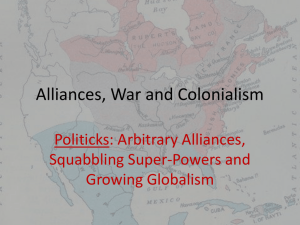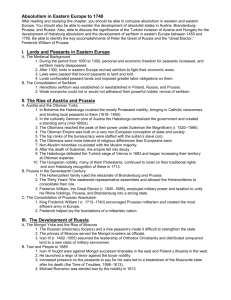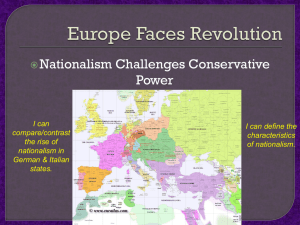19th Century Nationalism - APEH
advertisement
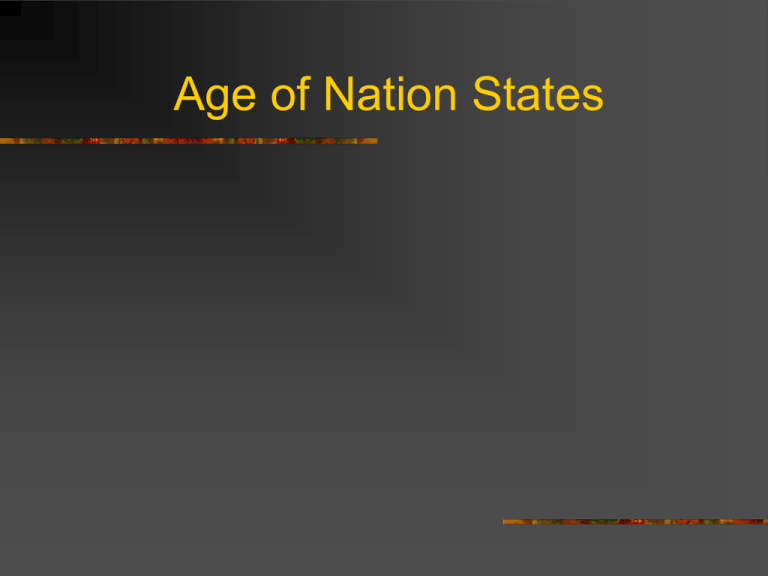
Age of Nation States Origins of Nationalism (This slide is review !!) What is a Nation? not a state not a political entity Usually thought of as combining: common history -common language [problem in Eastern Europe] common religion self-awareness of group status The Crimean War Started over two disputes The Ottoman’s gave Roman Catholics control over holy places in Palestine Russia wanted to extend control over Moldavia and Walachia(Romania) Russia used the right to protect Orthodox Christians to move into the two territories Conflict between France and Britain vs. Russia was due to the weakness of the Ottomans Both sides were terrible First war to be photographed Crimean Results 1856 Treaty of Paris Russia surrendered territory near the Danube Black Sea became neutral Russia gave up claims to protecting Ottoman Christians Concert of Europe ended Reforms in the Ottomans 1839- Hatt-I Sharif of Gulhane Reorganize the empires administration and military like the rest of Europe 1839-1876 – Reorganization Era Reforms by councils Hatti-I Humayun Opened up the economy, ended tax farming, and corruption Extended civic religious equality Rights for non-Muslims Required military service for non-Muslims Eliminated torture Opened up to European scholarship Reforms were not completed uniformly Led to calls for a Constitution Led to military revolt- Young Turks Italian Unification •Division of Italy: •Bourbon king ruled Kingdom of Two Sicilies, •Pope governed Papal States, •Habsburg princes ruled duchies of Tuscany, Parma, Modena • Piedmont and Sardinia ruled by House of Savoy (Italian) Forces against unification of Italy Except for middle Class most Italian clung to values of Old Regime Peasants and ruling class rejected values of Enlightenment and French Revolution Religious people and traditionalists rejected unity (Pope must rule Rome and Central Italy) Forces for unification of Italy Middle class merchants and manufacturers (they wanted r.r. and roads, abolish taxes on trade goods from one part of Italy to another, standardized weights, measures, and coins, wanted greater opportunity) Students – influence of Romanticism; the “glorious past” of the Roman Empire Failed Revolution Carbonari – secret societies Brief revolutionary success in 1829 – King. Of Two Sicilies Little support from peasants; Austrian suppression Mazzini – Young Italy Count Camillo Benso di Cavour Cavour’s Policy Cavour & Victory Over Austria Count Camillo Cavour was the architect of Italian unity (chief minister of Piedmont) Reorganized currency, taxes, built r.r. – modernized Piedmont joined England and France in Crimean War At peace conference Cavour denounced Austrian occupation of Italy Practical statesman – opposed to democratic republics Conservative nationalist Cavour gained support of Napoleon III (Fr.) Piedmont conquered Lombardy, Milan Revolutions in Parma, Modena, Tuscany, Romagna – all joined Piedmont Garibaldi’s Campaign Garibaldi and Victory in the South Garibaldi Piedmont victory spurred revolution in K. of Two Sicilies Garibaldi and 1,000 Red Shirts liberated Sicily Garibaldi turned over conquests to King Victor liberal nationalist (Emmanuel of Piedmont – King of Italy 1861) During 1866 conflict between Austria and Prussia Venetia was added to Italy During Franco-Prussia War (1870) Rome was added New Italian State France- protecting Rome for the pope, Withdrew troops from Rome. Italian state troops move in and take Rome united Italy. North and South Pro-State and Pro-Pope parties: Pope becomes "Prisoner of the Vatican Huge class divisions German Unification After 1848 Prussia was strongest state in Germany. Only Prussia could unite Germany William I had a problem of controlling the Prussian Parliament and getting money Recruited Bismarck. 1862. Had been Ambassador to Russia and France In 1848 to Frankfurt Assembly Otto von Bismarck (1815-1898) Most remarkable political leader of late 19th century. Ruled Prussia from 1862, and Germany from 1871, to 1890, as Chancellor. Blood and Iron - Speech to Parliament 1862 - Germany would not be united by the liberals who had no power base, but rather by blood and iron. Unification of Germany Zollverein [A customs union] 1834: Pushed idea of non-Austrian Germany. 1848 - Frankfurt Assembly debated issue of Klein [little] or Gross [big] Deutschland. Inclusion of Austria. Austria contained many other nationalities than Germans Three Prussian Wars War with Denmark 1864 Schleswig-Holstein - cause of the dispute. Austria supports Prussia. Prussia becomes leader of Germany. War with Austria 1866 - lasts 7 weeks Austria isolated from France and Russia Victory meant Austria gave up its role in Germany. North German Confederation established in 1866. Creates structure of Bundesrat and Reichstag War with France 1870-71 Over Spanish Marriages. Bismarck doctors the Ems telegram to insult France. Brings Southern Germany into war with France, claims Alsace-Lorraine Prussia Wins - 1870 - Battle of Sedan. The German Empire [Reich] 1871 Empire proclaimed in the Hall of Mirrors at Versailles in 1871. All German state, maintaining some independence agree to join a German Empire. United German Parliament: the Bundesrat, lower house called the Reichstag. Germany is united by semi-authoritarian nationalism. This was the "Second Reich." Not a liberal democracy, Slightly limited monarchy Dominated by the old ruling class France- Third Empire Louis-Napoléon Bonaparte, nephew of the great Emperor, won a landslide election victory. Seized power in a coup d'etat on 2 December 1851. In 1852, he moved into the Tuileries Palace as Emperor of France Napoléon III. Empire Building Napoléon III combined authoritarianism with crowd-pleasing social welfare in true Bonapartist style. Attempted to make Austrian Archduke Maximilian Emperor of Mexico. He had plans for Paris too: to complete the Louvre, landscape the Bois de Boulogne, construct new iron market halls at Les Halles, and open up a series of new boulevards and train stations. Appointed Baron Haussmann Préfet de la Seine from 1853. Paris was a showcase city, with the first department stores and the International Exhibition of 1867. With so much building work, there was plenty of opportunity for speculation. The world capital of sensual pleasure was again decried as a 'New Babylon'. , Charles Garnier's Palais Garnier. Haussmann was forced to resign in 1869 after some of his projects were found to be based on highly questionable accounts. Palais Garnier. 1870-71: Franco-Prussian War In 1870, the Emperor was maneuvered into war with the German states, led by Bismarck's Prussia. French were crushed at Sedan, on 4 September 1870; Napoléon III abdicated. A new Republic was proclaimed to much cheering at the Hôtel de Ville. Yet within weeks Paris was under Prussian siege. Beleaguered Parisians starved. The French government negotiated a temporary armistice, then hastily arranged elections for a National Assembly mandated to make peace. Paris voted republican, but the majority went to conservative monarchists. Peace agreed at Versailles on 28 January 1871 a five billion-franc indemnity, Occupation by 30,000 German troops and ceding of Alsace-Lorraine was seen as a betrayal the new Assembly under Adolphe Thiers spurned the mutinous capital for Versailles. Paris commune March to May 1871 Adolphe Thiers sent a detachment of soldiers to Montmartre to collect 200 cannons from the Garde Nationale paid for through public subscription to defend the city during the German siege. insurrectionists led by schoolteacher Louise Michels fended off the troops. Thiers immediately ordered all government officials and the army to head for Versailles, leaving the city in the hands of the poor and a wide-ranging spectrum of radicals. On 26 March, the Commune of Paris created at the Hôtel de Ville Workers, clerks, accountants, journalists, lawyers, teachers, artists, doctors and a handful of small business owners, Decreed the separation of Church and State, the secularization of schools, abolition of night work in bakeries, creation of workers' cooperatives, moratorium on debts and rents. Artists got swept up in Commune fever. A federation established in April 1871 attracted such talents as Corot, Daumier, Manet and Millet. Mission: to suppress the Academy and the Ecole des Beaux-Arts, in favor of art freed of governmental sanctions. Courbet reopened the Louvre and the Muséum d'Histoire Naturelle. On 12 April, the column on place Vendôme celebrating Napoléon's victories was knocked down. Strong Commune support among workers and intellectuals, Lack of organization and political experience proved fatal, Outnumbered. Thiers and his Versaillais troops retook the city. the Commune's two principal military strategists, Flourens and Duval, were taken prisoner and executed. An estimated 3,000-4,000 Communards were killed in combat, The Commune retaliated by kidnapping and killing the Archbishop of Paris and other clergy, setting fire to a third of the city. The Hôtel de Ville and Tuileries palace were set ablaze. The Third republic Established in 1871, was an unloved compromise, Survived for 70 years. The right yearned for the restoration of the monarchy; to the left, the Republic was tainted by its suppression of the Commune. Paris' busy boulevards, railway stations and cafés provided inspiration for the Impressionists, led by Monet, Renoir, Manet, Degas and Pissarro. Rejected by the official Salon, their first exhibition took place in 1874 in photographer Félix Nadar's atelier, on boulevard des Capucines. The city celebrated its faith in science and progress with two World Exhibitions. The 1889 exhibition was designed to mark the centenary of the Revolution and confirm the respectability of the Third Republic. Centerpiece- the Eiffel Tower. On 1 April 1900 another World Exhibition greeted the new century. A futuristic city sprang up along the Seine, of which the Grand and Petit Palais, ornate Pont Alexandre III and Gare d'Orsay (now Musée d'Orsay) remain. In July, the first Paris Métro shuttled passengers from Porte Maillot to Vincennes, in the unheard-of time of 25 minutes. The 1900 Exhibition drew over 50 million visitors. Dreyfus Affair Time to add your own. . . Who was Dreyfus Who else was involved? What happened to him What were the political impacts? Austria-Hungary Hapsburg post 1848 1/6 Ger left out (Austro & Bohemians) multi-national empire: Lasts until 1918 Prob: how to deal w/national self-expression wanted certain nat’l rights - not to destroy empire Hungary: const. autonomy Slavs: Austroslavism needed large political structure empire provided Francis Joseph (r. 1848-1916) longer than Queen Victoria) disliked change: anything liberal, progressive, modern allies: Cath hierachy, Vatican personally: incapable of enlarged views, ambitious projects, bold decisions, persevering action surr. self in dream wld of imperial crt. Govt not idle: experiments tried, but never long enough main focus: Germanization centralization...distasteful to non-Ger, i.e. Magyars Ausgleich: Compromise of 1867 Austro-Bohemian Germans & Magyars common disadvantage to Slavs (who were seen as less than civilized wo/guidance) idea behind comp = Ger/Magyars each “govern its barbarians in its own way” Austria / Hungary each considered exactly = ....ea own const./own parl Austria as kind of Ger nation state, Hungary as kind of Magyar nation state... tie: same person emperor in Austria / King in Hungary delegates of parls met reg: common ministry for finance, foreign affairs, war Ger < 1/2 ppl Austria and Magyars < 1/2 ppl Hungary Aust: Slovenes, Czechs, Poles, Ruthenians, (Ital) Hungary: Slovaks, Croats, Serbs, Transylvanians Form: Const. parliamentary states neither democratic landlordism predominant vs. peasant masses abol of serfdom 1848 maintained, but not really allowed to affect nationality TSARIST RUSSIA Russia covered one-sixth of the world’s land surface, was unprotected by natural boundaries, had a poor climate, poor communications, as well as extensive ethnic, religious, and cultural diversity held together by force. the Renaissance, the Reformation, the Scientific Revolution, the Enlightenment, the Industrial Revolutionbarely touched Russia. Made Russia a backwards country; however, the fact that their rulers intermarried with those of Europe gave them some claim to being part of Europe. Autocracy of Tsar no real notion men have rights, justice tsar not rule by law Ukase, police, army State built by import Eur technol...often forced pure bureaucracy under tsar no real connection w/ppl tsar not interested in liberty, fraternity, or just & classless society, Indiv personality enriched by humane culture & moral freedom... Ideas more Russians gained from Eur contact, & of which govt was afraid Press & universities censored, repressed Russian Serfdom Resembled slavery: serfs “owned” - bought/sold Unpaid labor on land Factories/mines, or rented out More free (artisan, mechanic), but paid fees to lord, or returnd when summoned Total depend upon personality Economic position of lord law not interfere Educated Russians intelligentsia a class apart Students, univ grads, leisure to read Not very free to think...yet more free to think than to do almost anything else Believed intellectuals should play lg role in society Had exaggerated idea of direct influence of thinkers.... Some turned in disillusionment to rev & terrorist philosophies govt fearful of possibilities Crimean War Crimean War exposes Russia’s weakness Economically backward Technologically behind Tsar Alexander II decides to abolish serfdom in 1861 "better to abolish serfdom from above than to wait until it begins to abolish itself from below" But freed serfs had to pay back the landlords and fell into debt Some reforms made in the government but no fundamental changes in limiting Tsar’s power Tsar Alexander made some reforms in 1864, but he was unable to control the forces unleashed by his reform program. Reformers want more and rapid change. Alexander II assassinated by revolutionaries in 1881 Some reforms made in the government but no fundamental changes in limiting Tsar’s power Tsar Alexander made some reforms in 1864, but he was unable to control the forces unleashed by his reform program. Reformers want more and rapid change. Alexander II assassinated by revolutionaries in 1881 ALEXANDER II The newly found freedoms and spirit provided the right environment for a number of revolutionary groups to grow, including the nihilists and the populists. The most dangerous revolutionaries proved to be a group called the "Will of the People" which believed that terrorist acts and assassinations of top government officials was the swiftest way for them to change society and overthrow the government. Alexander III In reaction, Alexander III sought to roll back his father’s reform He and Nicholas I perfected the police state. He forced industrialization on Russia, including the building of the Trans-Siberian Railroad in 1891. Forced industrialization, however, created a discontented working class. Emancipation Act 1861 Alex II wanted supp of lib intelligentsia Relaxed repression Nicholas I: reactionary New newspapers, journals Entrance of revol lit from outside.. i.e. Polar Star: Alex Herzen Result: grt outburst pub opinion: biggest = end serfdom! “third section” (secret police) Had tried to alleviate serfdom Alex II studied problem: Couldn’t risk destroy labor sys/econ or ruin necessary gentry... Emancipation Act 1861 serfs legally free in western sense Subjects of govt, not owners 1/2 land gentry 1/2 to former serfs paid redemption fees outright ownership of land prop not really private mir: coll. prop of village instead of prop mort., got $ & not obligated to peasants gentry not weakened Mir resp.as unit to govt Still allowed for forced labor – to prevent migration controlled assign of land govt forbade sell/mort land to outsiders lack investment from other nations members not actually equal restrictd by mir as had been by lord... Judicial Reforms westernizd: an edict of 1864 trials public repres. by lawyers own choice no class distinctions: in theory higher/lower courts professional training judges sys of juries basically attempted - rule by law Reforms for Middle and Upper Classes Another edict 1864: Zemstvos(elected): provincial & district councils many libs want national repres. body, like Duma Alex II refused post 1864... pendulum swung back matters of: education, medical, welfare, food, roads Developed civic sentiment conservative (rev in Poland 1863) Alex began mollify those who disliked reforms Essence of reforms remained Great Britain Toward Democracy Overview of GB GB is model liberal state Prosperity mitigates social conflict of 1830s & 40s Wealthy remain in power (sportsmanship, take turns) Unions push for cash, Par. absorbs new interests Gladstone & Disraeli expand suffrage Second Reform Act of 1867 Working class more prosperous & responsible by 1860 Conserv. Disraeli allows expansion of suffrage Hopes new voters will vote Conserv. # of voters goes from 1.4m to 2.4m (2m more in 1884) New election (1868) produces Gladstone’s Great Ministry culmination of liberalism in GB 1868-74 aristocratic institutions opened to all: competitive CS exams end to purchase of commissions end to Anglican reqs at Oxford & Cam secret ballot 1870- gov’t takes over elem. schools citizens more loyal when there is less discontent Disraeli Follows Gladstone 1874 State action will help weak Pub. Health Act (1875) consolidates old laws & health & safety duty of state Artisans Dwelling Act (1875) Gov’t involved in housing Working Class More protection for unions Irish Home Rule major issue of Gladstones 2nd ministry Irish sought home rule Two major probs: Peasants defenseless against landlords Tithes to church of Ireland had already helped them (ends Church of Ire. & Land Act of 1870) Parnell establishes Irish bloc in Par. Balance of power (obstructionist) More Irish Rule 1885- Irish bloc hooks up with Libs. Ireland stays under GB, tries to reconcile with reform &. works 1892- Gladstone is reelected Some libs. go with Conservs. who win Home Rule Bill dies in House of Lords 1900- more land reform, gov’t helping peasants buy land 1912- HRB passed over Lords veto 3 times WWI stalls changes Even More Irish Rule N. Irish Presbyterians (Ulstermen) refuse to go with rest of Ire Catholic Ireland (Eire) ind. in 1922, N. Ire stay with GB RC minority in N. Ireland is pissed, continues to fight for ind. The Irish ? plays major role in GB politics from 1860-1920 New Nations and Democracy in Europe in 1800s The people of Belgium gained their independence from the Dutch in 1830 and established a constitutional monarchy under Leopold I. Norway and Sweden were united under one monarchy for most of the 1800s until Norway broke the union in 1905. In 1907 it became the first sovereign state to give the vote to women. Sweden followed their example in 1909. The Netherlands progressed toward democracy with their first constitution in 1849. Switzerland used the principle of direct democracy in their 1874 constitution. Denmark gained significant democratic reforms in the early 1900s. Spain and Portugal, unlike the rest of the nations of western Europe, made little progress toward democracy.

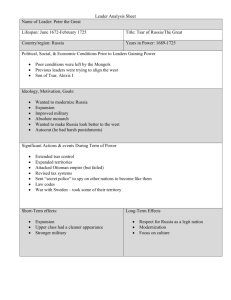

![Leader_Analysis_Sheet_Peter_the_Great[1]](http://s3.studylib.net/store/data/009220992_1-b864ff548a7d360a25262ba94c316f4a-300x300.png)
